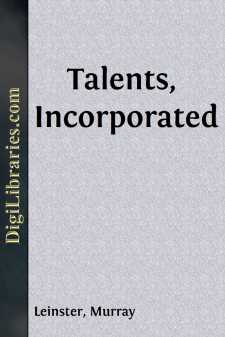Categories
- Antiques & Collectibles 13
- Architecture 36
- Art 48
- Bibles 22
- Biography & Autobiography 813
- Body, Mind & Spirit 142
- Business & Economics 28
- Children's Books 17
- Children's Fiction 14
- Computers 4
- Cooking 94
- Crafts & Hobbies 4
- Drama 346
- Education 46
- Family & Relationships 57
- Fiction 11829
- Games 19
- Gardening 17
- Health & Fitness 34
- History 1377
- House & Home 1
- Humor 147
- Juvenile Fiction 1873
- Juvenile Nonfiction 202
- Language Arts & Disciplines 88
- Law 16
- Literary Collections 686
- Literary Criticism 179
- Mathematics 13
- Medical 41
- Music 40
- Nature 179
- Non-Classifiable 1768
- Performing Arts 7
- Periodicals 1453
- Philosophy 64
- Photography 2
- Poetry 896
- Political Science 203
- Psychology 42
- Reference 154
- Religion 513
- Science 126
- Self-Help 84
- Social Science 81
- Sports & Recreation 34
- Study Aids 3
- Technology & Engineering 59
- Transportation 23
- Travel 463
- True Crime 29
Murray Leinster
Murray Leinster, the pen name of American writer William Fitzgerald Jenkins, was a prolific author known for his contributions to science fiction and pulp magazines. He wrote over 1,500 short stories, essays, and radio scripts, and is best remembered for his pioneering work in the genre, including the 1945 story "First Contact," which introduced the concept of universal translators. Leinster's innovative ideas and engaging storytelling earned him the title "the Dean of Science Fiction," and he was honored with a Retro Hugo Award for Best Novelette for "First Contact" in 1996.
Author's Books:
Sort by:
by:
Murray Leinster
Part One Chapter 1 Young Captain Bors—who impatiently refused to be called anything else—was strangely occupied when the communicator buzzed. He'd ripped away the cord about a thick parcel of documents and heaved them into the fireplace of the office of the Minister for Diplomatic Affairs. A fire burned there, and already there were many ashes. The carpet and the chairs of the cabinet...
more...
by:
Murray Leinster
CHAPTER I The little Med Ship came out of overdrive and the stars were strange and the Milky Way seemed unfamiliar. Which, of course, was because the Milky Way and the local Cepheid marker-stars were seen from an unaccustomed angle and a not-yet-commonplace pattern of varying magnitudes. But Calhoun grunted in satisfaction. There was a banded sun off to port, which was good. A breakout at no more than...
more...
by:
Murray Leinster
CHAPTER IThe Tube The generator rumbled and roared, building up to its maximum speed. The whole laboratory quivered from its vibration. The dynamo hummed and whined and the night silence outside seemed to make the noises within more deafening. Tommy Reames ran his eyes again over the power-leads to the monstrous, misshapen coils. Professor Denham bent over one of them, straightened, and nodded. Tommy...
more...
by:
Murray Leinster
CHAPTER ONE Jed Cochrane tried to be cynical as the helicab hummed softly through the night over the city. The cab flew at two thousand feet, where lighted buildings seemed to soar toward it from the canyons which were streets. There were lights and people everywhere, and Cochrane sardonically reminded himself that he was no better than anybody else, only he'd been trying to keep from realizing...
more...
by:
Murray Leinster
They were broadcasts from nowhere—sinister emanations flooding in from space—smashing any receiver that picked them up. What defense could Earth devise against science such as this? Did the broadcasts foretell flesh-rending supersonic blasts? The first broadcast came in 1972, while Mahon-modified machines were still strictly classified, and the world had heard only rumors about them. The first...
more...
by:
Murray Leinster
Bordman knew there was something wrong when the throbbing, acutely uncomfortable vibration of rocket blasts shook the ship. Rockets were strictly emergency devices, these days, so when they were used there was obviously an emergency. He sat still. He had been reading, in the passenger lounge of the Warlock—a very small lounge indeed—but as a senior Colonial Survey officer he was well-traveled...
more...
by:
Murray Leinster
CHAPTER 1 On the morning the radar reported something odd out in space, Lockley awoke at about twenty minutes to eight. That was usual. He'd slept in a sleeping bag on a mountain-flank with other mountains all around. That was not unprecedented. He was there to make a base line measurement for a detailed map of the Boulder Lake National Park, whose facilities were now being built. Measuring a base...
more...
by:
Murray Leinster
Detective Sergeant Fitzgerald found a package before his door that morning, along with the milk. He took it inside and opened it. It was a remarkably fine meerschaum pipe, such as the sergeant had longed irrationally to own for many years. There was no message with it, nor any card. He swore bitterly. On his way to Headquarters he stopped in at the orphanage where he usually left such gifts. On other...
more...
by:
Murray Leinster
The sky was black, with myriads of stars. The ground was white. But it was not really ground at all, it was ice that covered everything—twenty miles north to the Barrier, and southward to the Pole itself, past towering mountains and howling emptiness and cold beyond imagining. The base was almost buried in snow. Off to one side of the main building a faint yellowish glow was the plastic dome of the...
more...
by:
Murray Leinster
It started in Greece on the day after tomorrow. Before the last act raced to a close, Coburn was buried to his ears in assorted adventures, including a revolution and an invasion from outer space! We're not given to throwing around the word "epic" lightly, but here is one! Swashbuckling action, a great many vivid characters, and a weird mystery—all spun for you by one of the master...
more...











